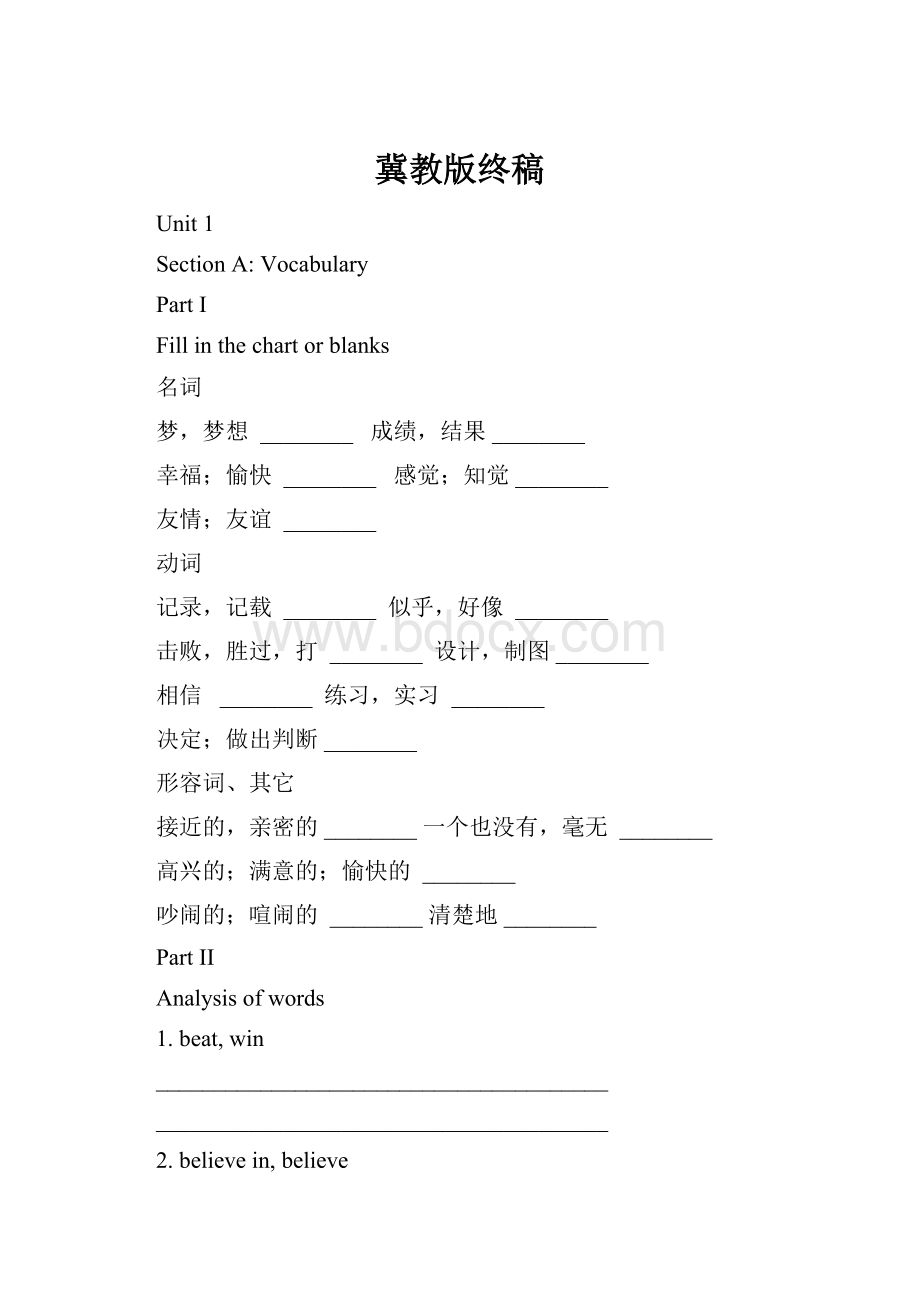冀教版终稿.docx
《冀教版终稿.docx》由会员分享,可在线阅读,更多相关《冀教版终稿.docx(51页珍藏版)》请在冰豆网上搜索。

冀教版终稿
Unit1
SectionA:
Vocabulary
PartI
Fillinthechartorblanks
名词
梦,梦想________成绩,结果________
幸福;愉快________感觉;知觉________
友情;友谊________
动词
记录,记载________似乎,好像________
击败,胜过,打________设计,制图________
相信________练习,实习________
决定;做出判断________
形容词、其它
接近的,亲密的________一个也没有,毫无________
高兴的;满意的;愉快的________
吵闹的;喧闹的________清楚地________
PartII
Analysisofwords
1.beat,win
_______________________________________
_______________________________________
2.believein,believe
_______________________________________
_______________________________________
_______________________________________
3.realize,cometrue
_______________________________________
_______________________________________
_______________________________________
SectionB:
KeyPhrases
PartI
Fillintheblanks
尽某人最大的努力________气馁;泄气________
信任;相信________赶上;跟上________
尽快________使某人感到自豪________
放弃________在…岁的时候________
既……又……;不但……而且……________
PartII
AnalysisofPhrase
1.comeupwithsth.;catchupwithsb.
____________________________________________
____________________________________________
2.getalong(with);geton(with)
____________________________________________
____________________________________________
3.other;others;theother;theothers;another
____________________________________________
____________________________________________
SectionC:
KeyGrammar
I.宾语从句
(1)意义:
_________________________
宾语从句分为三类:
动词的宾语从句,___________________和____________________。
(2)宾语从句中需要注意的三个问题
①语序:
_____________________________
②时态:
_____________________________
③引导词:
____________________________
II.不定式的用法
1.不定式做宾语
(1)it作形式宾语:
find(think,keep,make...)+it+adj.+(forsb)+todosth.
(2)不定式直接做动词宾语:
want(forget,remember,like,love,hate,continue,begin,start,hope,wish....)+todosth.
2.不定式做主语
(1)It做形式主语,不定式做真正的主语:
1)Itis(was)+adj.+(forsb)+todosth.
2)Ittakes(took,willtake)sbsometime+todosth.
(2)不定式直接做主语
Toplayfootballinthestreetisverydangerousforchildren.
3.不定式做表语
Mydutyistolookafterthekidswell.
4.不定式做定语
作定语时,不定式(短语)常置于被修饰的名词、不定代词等之后。
Ihave lotsofthingstodotoday.
5.不定式做状语
(1)不定式(短语)常跟在come,go,run,hurry等动词后作目的状语;或以“inorderto+动词原形”、“soasto+动词原形”等形式出现,或回答what...for?
/why...?
问句。
-Hi,Peter!
Whyareyouinsuchahurry?
-Tocatchthe7:
30train.
(2)作结果状语的不定式常以“enoughto...,onlyto...,too...to...”等形式出场,并能简化成so...that...句式。
例如:
6.不定式做宾语补足语
(1)用做make,let,have等使役动词的宾语补足语,省去不定式符号to.make(let/have)sbdosth.
(2)用做see,lookat,listento,hear,watch,notice等感官动词的宾语补足语,亦省去不定式符号to.
SectionD:
HaveaTry
PartI
Choosethebestanswerofthefollowingsentences
1.YourT-shirtissocool.Couldyoutellme________?
A.whereyoubuyitB.wheredoyoubuyit
C.whereyouboughtitD.wheredidyoubuyit
2.-Doyouknow________thegirlinredis?
-I’mnotsure.Maybeateacher.
A.whenB.howC.whereD.what
3.Thisnovelcanmakeyoulaughandcryat_______sametime.(2011上海)
A.aB.anC.theD./
4.Peterlikesreadinganewspaperheishavingbreakfast.
A.untilB.whileC.becauseD.though
5.Iwanttoknow________.
A.whenweshouldarriveattheairportB.whenshouldwearriveattheairport
C.whentheairportweshouldarriveatD.whentheairportshouldwearriveat
6.NeitheryounorI_____fromCanada.WearefromAustralia.
A.is B.are C.am D.be
7.-Tommy,doyouknowifFrank________tothezoothisSundayifit________?
-Sorry,Ihavenoidea.
A.willgo;isfineB.goes;isfine
C.willgo;isgoingtobefineD.goes;willbefine
8.Suetoldmethatshe_________shoppingwithhersisterthenextday.
A.willgoB.wouldgoC.goesD.hasgone
9.Wewillhavenowatertodrink_______wedon’tprotecttheearth.
A.untilB.beforeC.thoughD.if
10.“-Sorryforbeinglateagain.”
“-________hereontimenexttime,oryou’llbepunished.”
A.BeB.BeingC.TobeD.Been
11.Idon’tknowthecity.WherecanIfind________goodrestaurant?
(2011沈阳)
A.aB.anC.theD./
12.Ourteachertoldusthesun________intheeast.
A.riseB.roseC.risingD.rises
13.TheyboughtGrannyapresent____shelikeditverymuch.
A.and B.so C.but D.while
14.-Listen!
It is still noisyin thehead teacher’soffice.
-Go and see________theyhavefinished correcting thepapersyet.
A.though B.whetherC.unless D.while
15.Idon’tknowifmyuncle________.Ifhe________,Iwillbeveryhappy.
A.comes;willcomeB.willcome;willcome
C.comes;comesD.willcome;comes
16.Theydeveloptheirskills_________theycandothingsbetterandbetter.
A.howeverB.becauseC.sinceD.sothat
17.Don’t_______toomuchTV.It’sbadforyoureyes.
A.watchB.watchedC.watchingD.towatch
18.-Wedon’tknow________.
-ItissaidthathewasborninCanada.
A.whatheisB.wherehewasborn
C.wherehecomesfromD.ifheliveshere
19.Excuseme.Isthereapostofficeintheneighborhood?
Yes,thereis____acrossfromthesupermarket.
A.oneB.itC.thisD.that
20.____Igotback,Ifoundmymothercookingforme.
A.WhenB.BeforeC.SinceD.Although
21.IfTom_____thegame,we'llgivehimasurprise".
A.winB.winsC.wonD.miming
22.--Couldyoutellme____hecamehere?
--Hedrovehimself.
A.howB.whyC.whenD.whether
23.--Tomisn’tfeelingwell.
--Heseemstohaveacold____theweatherchangessuddenly
A.beforeB.soC.becauseD.though
24.--Youstudy______hard_______you’resuretopasstheexam.—Thankyouforsayingso.
A.enough…toB.as…asC.so…thatD.such…that
25.--Doyouthink________aconcertinourschoolhallthisweekend?
--Yes,therewill.
A.therewillhaveB.therewillbeC.willtherebeD.willtherehave
PartII
Fillintheblankswiththeappropriateformsofthegivenwords
1.Theflowersmust_____________(water)everyday.
2.AsaChinese,I’m__________(pride)ofmymotherland.
3.Don’tspeaktothedisabledpeople____________(polite)orlaughatthem.
4.Myfatherisso_____________(energy)thatheneverappearstired.
5.Nevergiveup_________(learn)Englishandonedayyouwillachieveit.
6.Morevegetablesandlessmeatcankeepyou________________(health).
7.Didyouenjoy___________(you)intheparty,kids?
8.Theoldmanplannedtogiveawayallhehad___________(help)thepeopleinneed.
9.Pleaseshowmethephotos_________(take)inTibet.
10.Areyouallowedtostudyata___________(friend)house?
11.Thequestionistoo____________(hard)forthemiddleschoolstudents.
12.HewasreadinghisbookwhenI_________(go)tovisitthem.
13.Themoreyoupractice,the____________(easy)itbecomes.
14.Icouldn’tunderstandwhyhewasso__________(interest)intheinvitation.
15.Nancyistooyoungtolookafter___________(she).
16.Bothofthegirls______________(succeed)inpassingtheexamlastterm
17.Youngpeopleneed____________(spend)sometimeonsports.
18.Iwonderwhythe__________(leaf)onthetreehavebecomeyellowrecently.
19.Thanksforyour___________(value)suggestions.
20.Thankyouverymuchforyour___________(invite).ButI’msosorrythatIcan’tcometoyourpartytomorrow.
Unit2
SectionA:
Vocabulary
PartI
Fillinthechartorblanks
名词
清单,表________双胞胎之一________
动词
设计;计划________称……的重量________
形容词、其它
有用的;有帮助的________
(二者)都不________死的________
不可能的________是否;不管;无论________
PartII
Analysisofwords
1.everyday,everyday
____________________________________________
____________________________________________
2.also,too,either
____________________________________________
____________________________________________
____________________________________________
SectionB:
KeyPhrases
PartI
Fillintheblanks
遍及全世界________以...自豪________
想出________尝试去做某事________
了解,找出________参与________
同时________不但……而且……________
更喜欢某事物;选择某事物(而不选择其他事物)________
既不……也不……________
PartII
AnalysisofPhrase
1.lookfor;find;findout
________________________________________
________________________________________
________________________________________
2.join,takepartin
_______________________________________
_______________________________________
3.trytodosth,trydoingsth
_______________________________________
_______________________________________
SectionC:
KeyGrammar
1.分类:
形容词和副词有原级、比较级和最高级三级。
原级变为比较级和最高级时有规则变化和不规则变化两种。
2.规则变化:
(1)单音节和部分双音节形容词和副词,在原级的后面加上er,est构成比较级和最高级。
a)____________________________
b)_____________________________
c)_____________________________
d)_____________________________
(2)两个音节或两个以上的音节的,在原级前加____________________
3.不规则变化:
原级
比较级
最高级
good好的
_____________
_____________
well好;(身体)好的,
bad,badly糟糕的,糟糕地
_____更糟糕的,更糟糕地;(身体)更不舒服的
worst最糟糕的,最糟糕地;(身体)最不舒服的
ill(身体)不舒服的
many许多的(可数)
______________
_____________
much许多的(不可数);非常
little少的
______________
_____________
far远的;远地
farther更远的;更远地
farthest最远的;最远地
further进一步的(地)
furthest最深刻的(地)
4.原级的用法:
说明人或事物自身的特征、性质或状态
有副词very、so、too、enough、quite等修饰
A与B在某方面程度相同或不同
(1)肯定句:
A+be+as+形容词原级+as+B.译为___________________________
LucyisasbeautifulasLily.
(2)否定句:
A+be+as/so+形容词原级+as+B.译为______________________
________________________________________
5.比较级的用法:
(1)讲述两者有差异,基本句型:
主语(‘A’)+谓语动词+形容词/副词比较级+than+第二个人物(‘B’).
Eg:
现代的火车比轿车快了
__________________________________________________
(2)特殊用法
①比较级+and+比较级
造句:
天越来越温暖了。
__________________________________.
②the+比较级…,the+比较级…
造句:
我们栽的树越多,情况就会越好
_______________________________